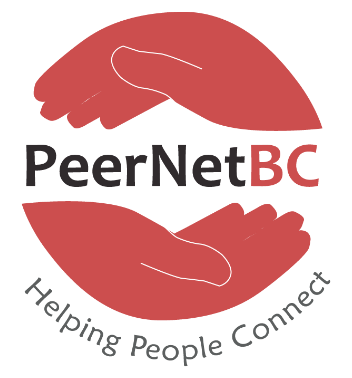PeerNetBC workshops cover a range of topics related to peer-led groups, including facilitation, community and youth engagement, and diversity, equity and anti-oppression. We offer a standard workshop series based on these themes to both the general public and to youth communities. We also work with organizations, companies and grassroots groups to create customized workshops (related to the topics listed below) geared towards their specific context.
All of our workshops, custom content, and curriculum, are created with our values in mind.
What themes do we cover?
Peer / Group Dynamics
- Principles of Peer Support
- Group Development
- Conflict Styles
Facilitation Training
- Foundations of Facilitation
- Exploring Facilitation
- Boundaries and Communities of Care – Practicing Care
Diversity and Anti-Oppression
- Diversity & Working Together
- Anti-Oppression
- Allyship
- 2SLGBTQIA+ Awareness
- Community Engagement & Inclusive Leadership
Community standard workshop descriptions
Foundations of Facilitation: Whether we are facilitating meetings, group discussions, or workshops, our roles and responsibilities as facilitators are essential for creating engaging spaces for groups to work together. In this workshop, participants will be introduced to the principles of peer support and explore their roles in creating a foundation for more inclusive and cohesive peer-led groups. We will build on new and existing skills and tools necessary for effective facilitation and touch on different facilitation models. This is an introductory workshop and is open to folx with little or no facilitation experience as well as those with experience who are looking to brush up on their foundational skills.
Exploring Facilitation: Building off of the concepts introduced in “Foundations of Facilitation,” this workshop delves deeper into specific skills and techniques that assist facilitators in creating safer, more supportive, and effective peer-led groups. Participants will have opportunities to practice facilitating and navigating facilitation challenges. Together, we will explore group dynamics, create an understanding of the influences of power dynamics in a group, and share strategies and tools.
Boundaries and Communities of Care: Facilitating peer-led groups can be an enriching experience, but it can also be very demanding. To avoid burnout and to make group facilitation sustainable, facilitators must have a clear understanding of personal boundaries and ways to practice care. In this workshop, participants will explore concepts for understanding personal boundaries, self-care, and collective-care within peer-led groups. Participants will share tips and tools for applying their learnings in real-life situations. Although it is aimed at facilitators, this workshop is beneficial for anyone juggling multiple demands or providing active support in the lives of others.
Diversity & Working Together / Anti-Oppression: Systemic imbalances of power exist in our society. Recognizing how these imbalances influence the spaces we belong to is essential for facilitators, groups, and community members. In this workshop, through discussion and experiential learning, participants will explore their roles and relationships with power and have an opportunity to broaden their perspectives on accessibility, allyship, inclusion, power, privilege, and how to work together equitably.
Allyship: Allyship is the active, consistent, and arduous practice of unlearning and re-evaluating, in which a person in a position of privilege and power seeks to operate in solidarity with a marginalized group. Allyship is not a state of being but rather a process based on relationships and accountability. This workshop strives to navigate the toughest of waters when it comes to allyship. It includes unlearning and reframing practices of allyship, exploring skills needed to support marginalized peoples and communities, and examining techniques you can use to map out your own actions towards allyship.
Community Engagement & Inclusive Leadership: This workshop explores, challenges, and redefines what leadership is and can be in our communities, and its relationship with advocacy and community engagement. By unpacking existing leadership frameworks, we’ll build an analysis of who we identify as leaders, how we can all be leaders, and our potential roles and responsibilities. Participants will create a shared understanding of what community engagement could be like, and how it can be more inclusive, impactful, and sustainable.
Examples of past youth standard workshops
In addition to our Standard Workshops, PeerNetBC also offers a Youth Standard Series that covers similar topics but is open only to those 25 and under. These workshops aim to create a youth-only space, so they’re delivered by youth too!
With every cycle, our themes shift to align with current events, youth interest, and demand. A few of our past standard workshops for youth include:
C(r)apitalism: Okay, so maybe this title sounds intense because capitalism is an economic system we live within, but we want to focus on exploring and understanding how this economic system affects us, as young people, particularly in regards to competition. Why do we feel like we have to compete with our peers, and where does this feeling stem from? What are the consequences of competition? How does it impact our lives, and what alternatives can we shift toward?
WTF is Oppression?: We’ve heard “anti-oppression” thrown around and are unsure of precisely what it means. Maybe we know a lot about it, or maybe we haven’t heard about it at all. Whatever our starting point, this workshop is an opportunity for us to gather with our peers to unpack new(er) concepts and understandings around the roots of discrimination, how and why it happens, and what it has to do with ourselves in the world today. Join us in this powerful, rising movement initiated by women of colour as we work together to contribute to their unfolding legacy.
Joining The Ally-Ship: So, you want to join the crew and be a good ally, but maybe you don’t know exactly how you do that. This workshop strives to navigate the toughest of waters when it comes to being an ally. This includes unlearning and reframing the practices of being an ally, exploring what skills are needed to support marginalized peoples/communities and going over some techniques you can use to map out your own journey.
